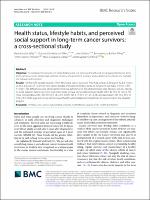Health status, lifestyle habits, and perceived social support in long-term cancer survivors: a cross-sectional study
Author
Date
2020-08-08Permanent link
https://hdl.handle.net/11351/5851DOI
10.1186/s13104-020-05218-8
ISSN
1756-0500
PMID
32771042
Abstract
Objective: To compare the presence of comorbidities and self-perceived health and social support between long-term cancer survivors and people without a history of cancer from a clinical trial examining the effects of a multiple risk behavior intervention. Results: Of the 4259 people studied, 190 (4.46%) were cancer survivors. They had a mean ±SD age of 62.8±7 years vs. 58.7±8 years (P<0.01) for non-cancer people and were more likely to be on long-term sick leave (11.9 vs. 3.5%, P<0.001). No differences were observed for smoking, adherence to the Mediterranean diet, physical activity, obesity, or social support. Cancer survivors were more likely to have worse self-perceived health (OR 1.82; 95% CI 1.02–2.75), more comorbidities (OR 1.68; 95% CI 1.18–2.39), COPD (OR 2.17; 95% CI 1.25–3.78), and depression (OR 1.65; 95% CI 1.06–2.57). Older age and worse self-perceived health were independent predictors of survivorship in the adjusted analysis.
Keywords
Primary care; Cancer; Survivorship; Lifestyle; Comorbidity; Quality of life; Health promotionBibliographic citation
León-Salas B, Zabaleta-del-Olmo E, Llobera J, Bolíbar-Ribas B, López-Jiménez T, Casajuana-Closas M, et al. Health status, lifestyle habits, and perceived social support in long-term cancer survivors: a cross-sectional study. BMC Res Notes. 2020 Aug 8;13(1):376.
Audience
Professionals
This item appears in following collections
The following license files are associated with this item:

 Private area
Private area Contact Us
Contact Us








